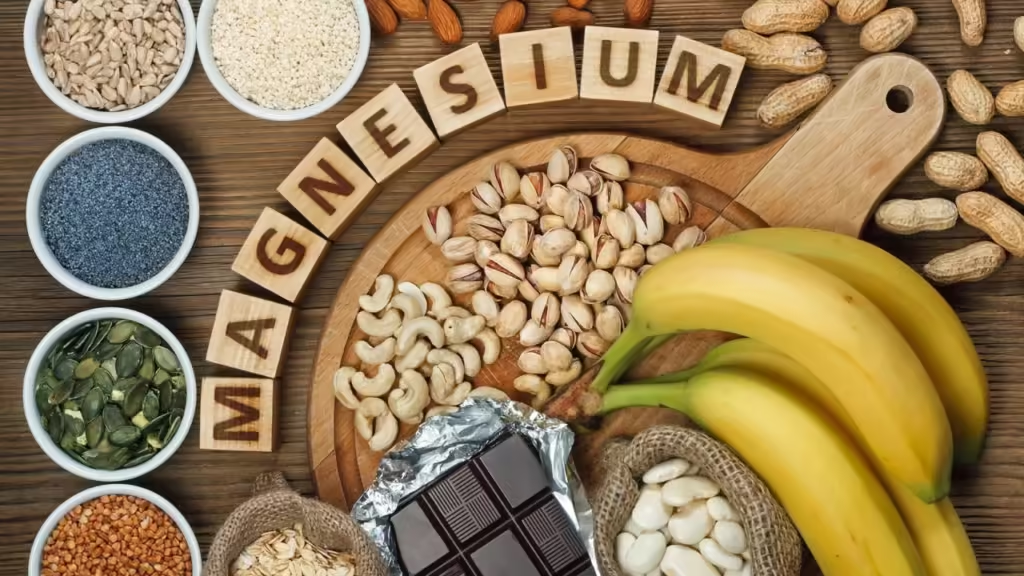Hello, Beautiful People! Are you sure your child is getting the right nutrients? We know that they are important for the growth and development of our kids; in particular, one of those essential nutrients is magnesium.
This main mineral supports everything from bone health to energy production. I was also ignoring this before I knew it’s importance. In this blog, we’ll explore the secrets of magnesium for kids.
After discussing this, you will make sure your child gets its proper amount. First, we need to understand why this mineral is so important. Additionally, we will explore how to easily include it in our child’s daily routine.
Get ready!
What is Magnesium?

Okay, let’s get straight to the point and understand this. Essentially, it is a natural mineral that is found in many foods; moreover, it helps our bodies function properly. Therefore, understanding its benefits is important for maintaining overall health.
We want to have strong bones and muscles and magnesium solves our problem. Moreover, it helps our nerves and brain function well. We need it to make energy and stay healthy.
You can find it in foods like green vegetables, nuts, seeds, and whole grains. Let me tell you that getting enough magnesium is important for everyone, particularly your kids.
Benefits of Magnesium for Kids
Let’s move on to the benefits; previously, I didn’t use it before knowing its various advantages. Trust me, you’re gonna love this!
Strong Bones: Magnesium helps build our bones strong; moreover, it is important for our growing kids.
Healthy Muscles: It supports muscle function; additionally, it helps prevent cramps and spasms.
Nervous System: Magnesium is important for the brain and nerves; consequently, it helps our kids stay calm and focused.
Energy Production: It helps turn the food our kids eat into energy; therefore, it keeps kids active and playful.
Heart Health: It keeps the heart rhythm steady and healthy; thus, it supports overall cardiovascular health.
Better Sleep: It can improve your kid’s sleep quality; therefore, it helps kids rest well at night.
Immune Support: It boosts the immune system; consequently, it helps kids fight off diseases.
The following video is about understanding magnesium:
https://youtu.be/Dyhe2MKa79E?si=S2P0iZFCDFCsVJT8
Signs of Magnesium Deficiency in Children
Thinking how can a person know that his child is having deficiency? Don’t worry, let’s discuss that!
Following are common signs that your child is having deficiency:
- Repeated cramps
- Unfamiliar tiredness
- Low energy levels
- Increased mood swings
- Difficulty falling asleep
- Loss of appetite
- General weakness
- Trouble in focusing
- Stomach discomfort.
- Numbness
- Slower growth compared to children of the same age group.
Foods Rich in Magnesium
After reading the above passage, you might be thinking what you should do next.
Don’t worry again, let’s get into understanding what food that you need to take.
Food |
Magnesium Content (mg per serving) |
|
Spinach (cooked, 1 cup) |
157 |
|
Almonds (1 ounce) |
80 |
|
Avocado (1 medium) |
58 |
|
Black Beans (cooked, 1 cup) |
120 |
|
Cashews (1 ounce) |
74 |
|
Pumpkin Seeds (1 ounce) |
168 |
|
Dark Chocolate (1 ounce) |
64 |
|
Whole Wheat Bread (1 slice) |
23 |
|
Banana (1 medium) |
32 |
|
Brown Rice (cooked, 1 cup) |
84 |
|
Oatmeal (cooked, 1 cup) |
61 |
|
Yogurt (plain, 1 cup) |
30 |
|
Tofu (firm, 1/2 cup) |
37 |
|
Edamame (cooked, 1 cup) |
99 |
|
Potatoes (baked, 1 medium) |
48 |
These foods are easy to include in meals; additionally, they make sure your kids get the magnesium their body needs.
Supplements: When and How?
In this section, we’re gonna talk about four points; after getting through them, you will easily be aware of when to give magnesium supplements to your kids.:
1. Dietary Insufficiency
If your child’s diet lacks foods that are rich in magnesium, supplements can be needed.
2. Medical Conditions
There are some health conditions in which your child can have reduced levels. Subsequently, your kids require supplementation.
3. Symptoms of Magnesium Deficiency
Some symptoms of its deficiency include:
- Muscle cramps
- Fatigue
- Concentration issues.
4. Doctor’s Recommendation
Always take supplements if your doctor recommends them; otherwise, you might not get the benefits you need.
How to Use Magnesium Supplements
- Types of Supplements:
- Magnesium Citrate: It is easily absorbed by the body. It helps with constipation.
- Magnesium Glycinate: It is soft on the stomach. And, it is good for overall health.
- Magnesium Oxide: It contains higher levels of magnesium. This may cause digestive trouble.
- Dosage:
- Follow the recommended dosage as prescribed by the doctor.
- Typical doses range from 80 mg to 240 mg. It depends on the child’s age and needs.
- Safety Tips:
- Talk to a Doctor: Always talk to a healthcare provider before you start taking any supplements.
- Start Low and Go Slow: Begin with a lower dose. Always increase slowly if needed.
- Check for Side Effects: Watch for any severe reactions to occur. It can be diarrhea or stomach upset.
- Combine with Food: Taking supplements with food can make better absorption. It lessens stomach pain.
- Supplement Form:
- Tablets/Capsules: They are the most common. Plus, it is easy to take.
- Powders: They can be mixed into drinks or food so it can be consumed easily..
- Gummies: They’re friendly for kids. Often, their taste is also good.
Final Tips
Balanced Diet First: Try to take all needed magnesium through balanced diet.
Stay Informed: You should keep updated on the latest recommendations for your children.
Regular Check-ups: You should go for regular medical check-ups; additionally, this can help detect magnesium levels and overall health.
Practical Tips for Ensuring Adequate Magnesium Intake
1. Include Magnesium-Rich Foods
Breakfast: For breakfast, you should include:
- Oatmeal
- Whole grain cereals
- Whole wheat toast.
Lunch: For lunch, you should take:
- Leafy greens
- Kale to sandwiches
- Salads.
Snacks: You should take:
- Nuts
- Seeds
- Banana.
Dinner: For dinner, take in:
- Legumes
- Lentils
- Broccoli.
2. Create Balanced Meal Plans with Magnesium
Always plan your meals. Include different foods that are rich in magnesium; additionally, use a weekly menu planner. In this way, you take a balanced diet.
3. Use Fun Recipes
- Try making smoothies with spinach, avocado, and banana.
- Another thing can be preparing trail mix with almonds, cashews, and pumpkin seeds. After that, bake with whole grain flours and dark chocolate.
4. Promote Magnesium Healthy Eating Habits
Always take suggestions from your kids in meal planning and cooking. This will make them more interested in healthy foods.
5. Magnesium-Fortified Foods
Look out for cereals or snacks that contain magnesium; moreover, check food labels for this information.
6. Hydration
Drink water and limit sugary drinks. Magnesium is better absorbed with good hydration.
7. Limit Processed Foods
Limit the intake of junk foods because they are often low in magnesium. Try to take whole, natural foods whenever possible.
8. Regular Meals Containing Magnesium
Make sure kids have regular meals and snacks to maintain steady energy levels. Don’t skip meals. This can cause nutrient deficiencies.
9. Supplements When Needed
Take in supplements if you think your dietary intake is less; however, always talk with a healthcare provider before starting supplements.
10. Monitor and Adjust
Check your child’s diet and adjust as needed; this will make sure they are getting enough magnesium.
By including these practical tips into daily routines, you have made sure that your child is getting the nutrients they need. This will help for their healthy growth and development.
People don’t realize the compound effect Magnesium deficiency has on their bodies.
• Fatigue
• Muscle Cramps
• Heart arrhythmia
• Increased anxiety
• Difficulty sleeping
• High blood pressure
• Lowered immune systemAnd much more.
Magnesium plays a critical role in over… pic.twitter.com/tifkQ2P6SG
— Tom – The Brain Battery (@TheBrainBattery) July 22, 2024
Myths and Misconceptions
Myth 1: Magnesium is Only Important for Adults
Fact: It is equally important for children. It supports their growth, bone development, and overall health.
Myth 2: Magnesium can be taken from Any Diet
Fact: Not all diets provide adequate amount of nutrients, but a balanced diet rich in whole foods is necessary.
Myth 3: More Magnesium is Always Good
Fact: More intake can cause health issues. It can be diarrhea and abdominal pain. In order to avoid that it’s important to follow the recommended dosages.
Myth 4: Magnesium Deficiency is Unusual
Fact: Its deficiency is more common than many people think; moreover, it is more in children who don’t take in a balanced diet. Consequently, solving this issue is necessary for maintaining proper health.
Myth 5: Supplements are the Better Method to Get Magnesium
Fact: Whole foods are the best source; however, supplements should only be taken when you’re not consuming a balanced diet. Furthermore, they should be used under medical advice to make sure proper dosage and avoid side effects.
Myth 6: Only Some People Need Magnesium
Fact: Everyone needs nutrients for their body to function properly; in fact, they are needed for all age groups. Therefore, making sure that children receive proper amount of nutrients is important for their health and development.
Now that you’ve understood these myths and the actual facts, you can, therefore, make informed decisions about making sure proper intake for your child’s health. Consequently, you will take necessary steps to support their health.
Conclusion
Lastly, you should make sure your child gets proper amount of magnesium. This is important for their growth and overall health.
This mineral supports strong bones, healthy muscles, proper nerve function, and energy production. While a balanced diet rich in all nutrients is the best perspective, supplements can help when necessary. Be conscious of the signs of deficiency. In that case, talk with a healthcare provider.
By disproving common myths and focusing on practical tips, you can easily include it into your child’s daily routine. Consequently, this approach allows you to give them a brighter future. Moreover, prioritize their intake to efficiently support their active and growing bodies.
Let me know what are you starting to give your child magnesium?
FAQ
1. List symptoms of lack of magnesium in children?
Common signs include:
- Muscle cramps
- Fatigue
- Irritability
- Sleep problems
- Poor appetite
- Weakness
- Concentration issues
- Nausea
- Tingling
- Slower growth.
2. How can I make sure my child gets good amount of magnesium?
You should include foods like leafy greens, nuts, seeds, whole grains, legumes etc. If there is deficiency, you should take supplements. Take them after discussing with a healthcare provider.
3. List foods that have magnesium?
The foods include:
- Spinach
- Almonds
- Avocados
- Black beans
- Cashews
- Pumpkin seeds
- Dark chocolate
- Whole wheat bread
- Bananas
- Brown rice
- Oatmeal
- Yogurt
- Tofu
- Edamame
- Potatoes.
4. Are magnesium supplements secure for children?
Yes, when it is used appropriately under the guidance of a healthcare provider. It’s important to follow the recommended dosage.
5. Can magnesium makes better my child’s sleep?
Yes, it can help improve sleep quality. It relaxes muscles and therefore, calm the nervous system.



